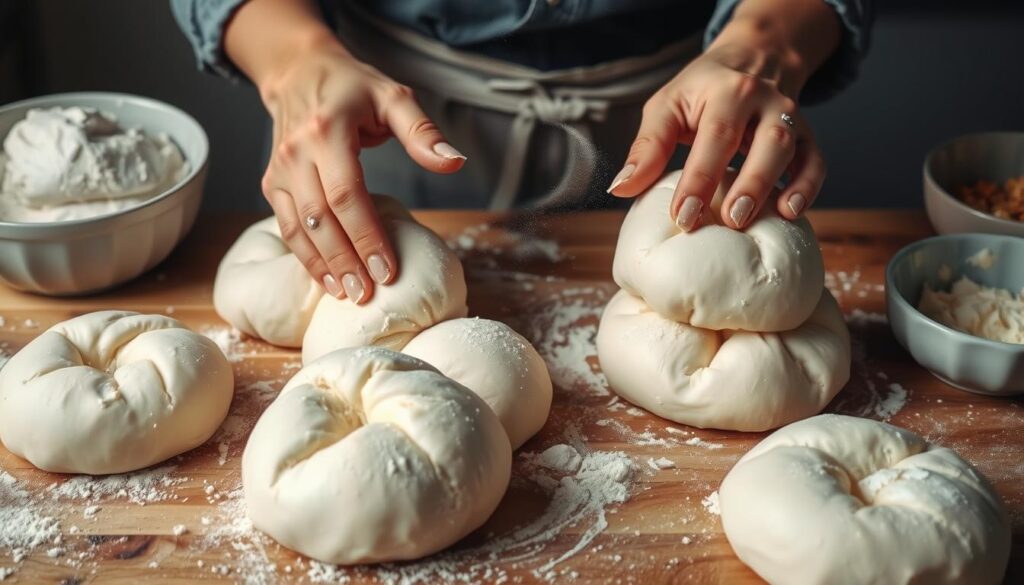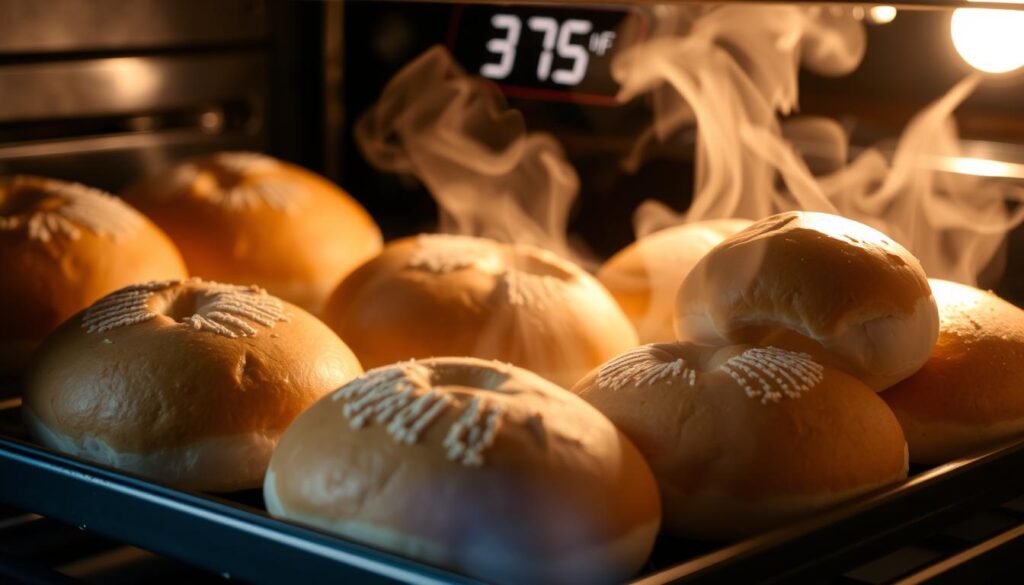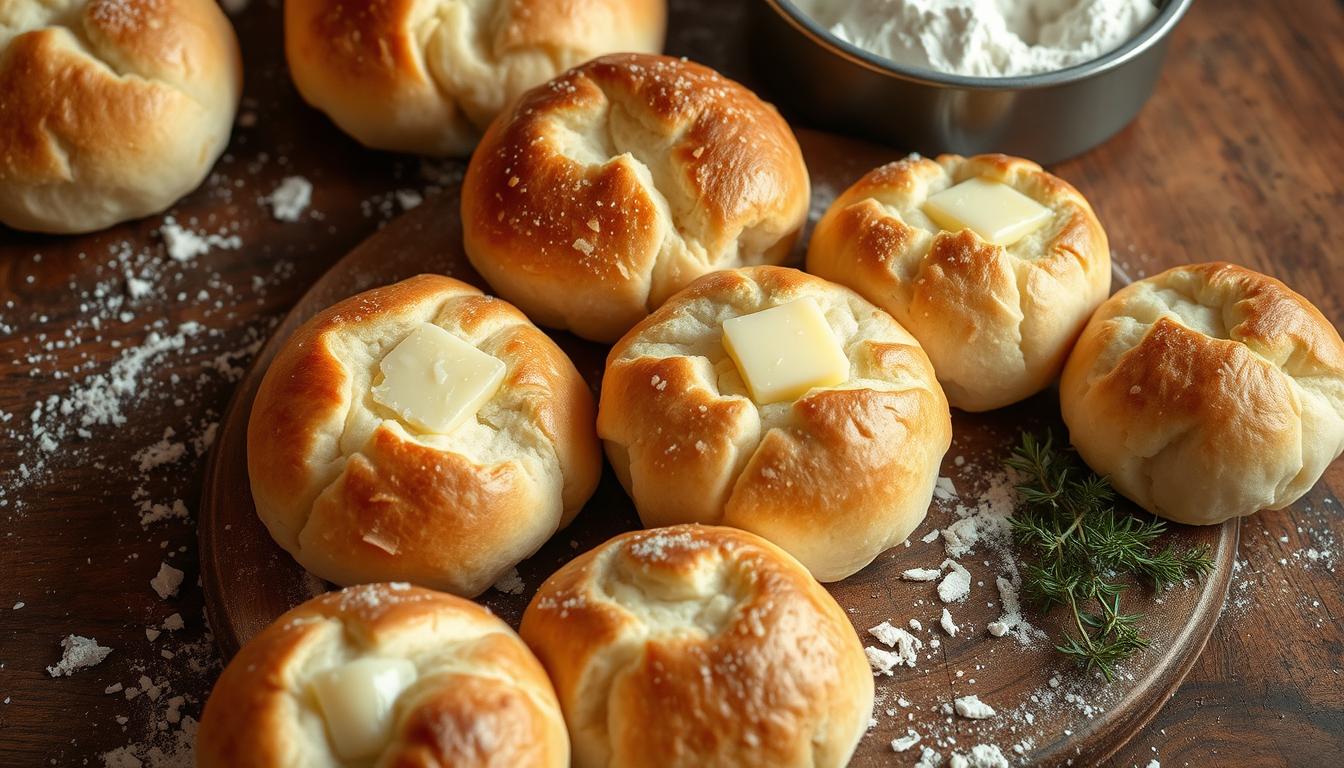As a passionate home baker, I know the feeling of having a jar full of sourdough discard in the fridge. It’s just waiting to be used. But turning that leftover starter into soft, fluffy dinner rolls? That’s a game-changer.
These sourdough discard rolls are the answer you’ve been looking for. They’re incredibly easy to make. The result is a batch of soft, fluffy rolls that will impress everyone. With a quick prep time and a hands-off rise, you’ll have these homemade bread rolls ready in just a couple of hours.
Table of Contents
Why These Sourdough Discard Rolls Are Perfect for Every Table
Enjoy the soft, fluffy texture and the tangy flavor of sourdough discard rolls. They’re great for any meal, from family dinners to weekend brunch. They pair well with soups, stews, and sandwiches.
Soft and Fluffy Texture
The rolls’ softness comes from a mix of all-purpose and whole wheat flours. This mix makes the crumb tender and satisfying. The sourdough discard adds a complex flavor that complements the dough’s sweetness.
Quick Preparation Time
These rolls are perfect for busy bakers. They’re ready in just 30 minutes, with a total time of 2 hours. They use sourdough discard and instant yeast for a quick rise, ideal for last-minute meals.
Zero Waste Baking Solution
Using sourdough discard in this recipe helps reduce waste. It turns valuable starter into delicious, soft rolls. This way, you save money and make your kitchen more sustainable.
These rolls are great as a side, for sandwiches, or as a breakfast treat. They add convenience, flavor, and eco-friendly benefits to your meals. Make them a staple in your kitchen and enjoy their irresistible taste.
Essential Ingredients for Perfect Sourdough Discard Rolls
Making sourdough discard rolls is all about mixing the right ingredients. You’ll need active dry yeast, warm water, sourdough discard, sugar, melted butter, salt, and all-purpose flour. You can swap white sugar for brown sugar or honey, but honey makes the dough stickier.
If you don’t have a sourdough starter, mix equal parts flour and water as a substitute. Use filtered water and sea salt for better flavor and texture in your rolls.
| Ingredient | Quantity |
|---|---|
| Active Dry Yeast | 1 teaspoon |
| Warm Water | 1 cup |
| Sourdough Discard | 2 cups |
| Sugar | 2 teaspoons |
| Melted Butter | 2 tablespoons |
| Salt | 1/2 teaspoon |
| All-Purpose Flour | 1 – 1 1/2 cups |
Choosing and measuring the right sourdough starter utilization and bread making ingredients is key. This will help you make soft, fluffy, and tasty sourdough discard rolls. Your family and friends will love them.
“The secret to the perfect sourdough discard roll lies in the harmonious balance of its ingredients.”
Equipment and Tools Needed
To bake tasty sourdough discard rolls, you need some basic tools and equipment. A stand mixer with a dough hook can help, but kneading by hand works too. Here’s a list of must-haves and nice-to-haves for these soft, fluffy rolls.
Must-Have Kitchen Tools
- Mixing bowls in various sizes
- A 9×13 or 8×8 baking dish
- A bench scraper or dough scraper
- A kitchen scale for precise measurements
- Beeswax wrap or plastic wrap for covering the dough during rising
- A digital thermometer to ensure the rolls are fully baked
Optional But Helpful Equipment
While not essential, these items can make bread-making easier and more fun:
- A stand mixer with a dough hook attachment
- A pastry mat or silicone baking mat for kneading and shaping the dough
- A proofing basket or parchment paper to help shape the rolls
- A baking stone or steel for creating a crisp crust
With these tools, you’ll get better at bread making techniques. You’ll make delicious sourdough discard rolls that everyone will love. The right tools are key to baking success.
Step-by-Step Mixing Process
Starting with sourdough discard rolls is easy. First, mix warm water with yeast in a bowl. Wait 5-10 minutes for it to get frothy. Then, add sourdough discard, sugar, melted butter, salt, and flour.
Knead the dough until it’s smooth. You can use a stand mixer or do it by hand. Make sure it passes the windowpane test.
After kneading, let the dough rise. Cover it and keep it warm until it doubles in size. This should take 45-60 minutes.
- Proof the yeast in warm water for 5-10 minutes until frothy.
- Add the sourdough discard, sugar, cooled melted butter, salt, and flour.
- Knead the dough until it’s smooth and passes the windowpane test.
- Cover the bowl and let the dough rise for 45-60 minutes until doubled in size.
Once risen, shape the dough into 12 rolls. Each should be about 76g. Roll them into balls and put them in a greased dish. Cover and let them rise for 30-45 minutes. They’ll be ready to bake.
The Science Behind Sourdough Discard in Baking
In sourdough baking, the discard is key. It’s the part of the starter you remove before feeding. This discard is full of wild yeast and good bacteria. They play a big role in how your rolls turn out.
How Discard Affects Texture
The enzymes and microorganisms in the discard break down gluten. This makes the dough stretchy and less likely to shrink. Your rolls will be soft and fluffy, just like they should be.
The fermentation process also breaks down phytic acid. This makes the bread easier to digest and helps your body absorb nutrients better.
Fermentation Benefits
- Enhances flavor complexity: The fermentation adds a tangy taste that balances the sweetness of the rolls. This creates a rich and complex flavor.
- Improves shelf-life: The acidity from fermentation stops mold and other bad bacteria from growing. This makes your sourdough rolls last longer.
- Increases nutrient availability: Fermentation breaks down complex carbs and proteins. This makes the nutrients in the bread easier for your body to use.
Using sourdough discard in your baking opens up a world of flavors and textures. It’s not just about making delicious rolls. It’s about understanding the science behind making them.
Shaping and Forming Perfect Rolls
Learning bread shaping techniques is key to making soft, fluffy, and pretty dinner roll formations. First, divide the dough into equal parts. You can make 12 or 24 rolls, each one a treat.
To shape the dough, fold the sides together and pinch them tight. Roll the dough on your countertop to make it smooth and round. Place the rolls in a greased baking dish, touching for pull-apart rolls or apart for individual ones.

For even baking and shape, use special pans like the LloydPans 10 x 2.25-inch round pan or the USA Pan 8-inch square pan. These pans fit 14 and 16 rolls, making your sourdough creations just right.
“The key to shaping buns and rolls is developing a uniformly tight exterior skin on the dough.”
To get a tight skin, use a bench knife to shape the dough. Chilling the dough for 15 minutes helps too. Also, cover the pans with plastic or use tall cups to keep the dough moist during the second rise.
| Baking Pan | Capacity | Recommended Roll Size |
|---|---|---|
| LloydPans 10 x 2.25-inch round pan | 14 rolls | 85g per roll |
| USA Pan 8-inch square pan | 16 rolls | 65g per roll |
| Nordic Ware Aluminum Half Sheet | Flexible capacity | Suitable for buns |
With these bread shaping techniques and dinner roll formations, you’ll make perfect soft and fluffy sourdough discard rolls for any event.
Rising and Proofing Guide
Getting the perfect rise and proof is key for soft, fluffy sourdough discard rolls. The proofing process has two stages: the first rise and the second rise. Knowing these steps will help you master bread proofing and make sure your rolls look great every time.
First Rise Tips
The first rise, or bulk fermentation, is when the dough starts to ferment. It usually takes 60-90 minutes at room temperature. The dough should double in size by then. This is when the dough fermentation really kicks in, making the rolls flavorful and light.
Second Rise Indicators
- After shaping, the rolls need a second rise, which takes 30-60 minutes.
- The rolls should look puffy and have grown by about 50% when ready to bake.
- Rising times can change based on your kitchen’s temperature. Warmer kitchens need less time, while colder ones need more.
Watch for visual signs and be patient during proofing. Hurrying can make your rolls dense. Let your sourdough discard rolls rise naturally for the best texture and taste.
Baking Temperature and Timing
To bake the perfect sourdough discard rolls, temperature and timing are key. Preheat your oven to 375°F (190°C) for glass dishes or 400°F (204°C) for metal tins. This ensures a golden crust and a soft, fluffy inside.
Bake the rolls for 25-30 minutes, watching to avoid over-browning. The rolls should reach an internal temperature of 190°F (88°C). This ensures they are fully cooked, with a tender texture and chewy bite.
For a shiny finish, brush the rolls with egg wash before baking. This adds a beautiful gloss. After baking, brush with melted butter to enhance flavor and soften the crust.
Remember, oven temperatures and baking times may vary based on your oven and roll size. Keep an eye on them during baking. Use these bread baking tips to get perfect sourdough discard rolls every time.

“The key to perfectly baked sourdough rolls is to strike the right balance between temperature and timing. With a little practice, you’ll be able to achieve the golden-brown crust and soft, fluffy interior that makes these rolls so irresistible.”
Storage and Freezing Methods
Your freshly baked Sourdough Discard Dinner Rolls can be enjoyed for days. Store them in a bread bag or wrap in a tea towel for up to 3 days. They also freeze well for longer storage.
Freezing Instructions
Baked rolls can be frozen for up to 3 months. Wrap them in plastic or foil, then in a freezer-safe bag. This prevents freezer burn and drying out.
When you’re ready, thaw the rolls at room temperature before reheating. For unbaked rolls, freeze them on a baking sheet after shaping. Then, transfer to a freezer container. Thaw the dough and let it rise before baking.
These easy storage and freezing methods let you enjoy homemade Sourdough Discard Dinner Rolls anytime. Whether fresh or from the freezer, they’re always delicious.
FAQ
What are the key ingredients in these sourdough discard rolls?
What tools and equipment are needed to make these sourdough discard rolls?
How does the sourdough discard contribute to the rolls?
How do you shape and form the sourdough discard rolls?
How long do the sourdough discard rolls need to rise?
What is the baking temperature and time for these sourdough discard rolls?
How can I store and freeze the sourdough discard rolls?
Source Links
- Super Soft Sourdough Discard Rolls – Jennibeemine – https://jennibeemine.com/super-soft-sourdough-discard-rolls/
- Easy Soft Sourdough Discard Rolls – https://www.farmhouseonboone.com/easy-soft-sourdough-discard-rolls/
- Lazy Sourdough Dinner Rolls with Discard – https://www.tastesoflizzyt.com/sourdough-rolls/
- Sourdough Discard Rolls by Make It Dough – https://makeitdough.com/sourdough-discard-rolls/
- Quick Sourdough Discard Buns – sarahtherese.co – https://sarahtherese.co/quick-sourdough-discard-buns/
- Soft Sourdough Dinner Rolls – https://littlespoonfarm.com/soft-sourdough-dinner-rolls-recipe/
- Sourdough Discard Rolls: Quick & Easy – https://www.fermentingforfoodies.com/sourdough-biscuits/
- Learn to make CallMePMc’s Sourdough Dinner Rolls – https://www.callmepmc.com/sourdough-discard-dinner-rolls/
- How to Make Easy + Irresistible Crusty Sourdough Rolls – https://heartscontentfarmhouse.com/crusty-sourdough-rolls/
- Sourdough Discard Dinner Rolls – https://healinghomerecipes.co/sourdough-discard-dinner-rolls/
- Sourdough Discard Dinner Rolls – https://thedinnerbell.recipes/sourdough-discard-dinner-rolls/
- Sourdough Discard Hawaiian Rolls – https://www.thisjess.com/sourdough-discard-hawaiian-rolls/
- Sourdough Cibatta Rolls [step by step recipe with photos] – https://www.pantrymama.com/sourdough-cibatta-rolls/
- What is sourdough discard? And what should I do with it? – https://www.kingarthurbaking.com/blog/2024/04/18/sourdough-discard
- Sourdough – https://en.wikipedia.org/wiki/Sourdough
- Sourdough Discard Bread – Bread by the Hour – https://breadbythehour.com/sourdough-discard-bread/
- How To Shape Buns and Rolls | The Perfect Loaf – https://www.theperfectloaf.com/guides/shaping-buns-and-rolls/
- Crusty Sourdough Dinner Rolls (No-Knead) – https://holycowvegan.net/crusty-sourdough-dinner-rolls-no-knead-and-no-added-yeast/
- The Ultimate Guide to Proofing Bread Dough | The Perfect Loaf – https://www.theperfectloaf.com/guides/proofing-bread-dough/
- Sourdough Dinner Rolls – Amy Bakes Bread – https://amybakesbread.com/sourdough-dinner-rolls/
- Sourdough Dinner Rolls – https://countryroadssourdough.com/same-day-sourdough-dinner-rolls/
- Soft Sourdough Rolls – https://www.kingarthurbaking.com/recipes/soft-sourdough-rolls-recipe
- Sourdough Discard Dinner Rolls – https://wildthistlekitchen.com/sourdough-discard-dinner-rolls/
- How to Freeze Sourdough Bread, Scones, & More (Easy & Fast) – https://livingbreadbaker.com/how-to-freeze-sourdough-bread-scones-more-easy-fast/

